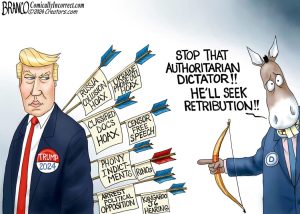Life, Liberty, Property #46: Milei is right: there is no such thing as market failure, just chronic government failure.
IN THIS ISSUE:
- Milei Is Right: There Is No Such Thing As Market Failure
- Same Old Bipartisan Big-Budget Blues Again
- A Sound Plan to Cut Federal Spending
- Cartoon
SUBSCRIBE to Life, Liberty & Property (it’s free). Read previous issues.
 Milei Is Right: There Is No Such Thing As Market Failure
Milei Is Right: There Is No Such Thing As Market Failure
The newly elected president of Argentina, Javier Milei, spoke at the World Economic Forum (WEF) in Davos, Switzerland last week. That is highly significant because Milei, an outspoken libertarian and self-described anarcho-capitalist, is about as far from the viewpoint of the international, elitist, crony-socialist Davos crowd as anyone can be.
The World Economic Forum is a 53-year-old nongovernmental organization devoted to “improving the state of the world by engaging business, political, academic, and other leaders of society to shape global, regional, and industry agendas,” as the WEF puts it. The WEF’s objective is to bring governments and more than 1,000 multinational companies together to rule over the people of the world through a confusing web of relationships that makes it all but impossible for the public to hold them accountable.
As Reuters put it in a WEF-sympathetic news article the day before the meetings began last Tuesday, “The Davos events were launched to champion ‘stakeholder capitalism’, which the WEF says defines a corporation as being not just about maximizing profits but fulfilling ‘human and societal aspirations as part of the broader social system’.” In plainer words, the goal of the WEF is to engage government and multinational businesses in a coordinated effort to share unlimited power over all aspects of human life throughout the world, with 2030 as their target date for full implementation.
Milei, the newly elected president of a nation that has spiraled out of control and been hit with triple-digit annual price inflation precisely through the rule of socialists, told the gathered elites that freedom is humane and productive and coercion is inevitably destructive. “Thirty-five years after we adopted the model of freedom, back in 1860, we became a leading world power,” Milei said. “And when we embraced collectivism over the course of the last 100 years, we saw how our citizens started to become systematically impoverished, and we dropped to spot number 140 globally.”
Despite its proponents’ fine-sounding statements of ideals, “socialism is always and everywhere an impoverishing phenomenon that has failed in all countries where it’s been tried out,” Milei told the gathering. “It’s been a failure economically, socially, culturally, and it also murdered over 100 million human beings.”
In contrast with the failures of socialism, the results of freedom are quite clear, Milei noted:
Countries that have more freedom are 12 times richer than those that are repressed. The lowest [income] percentile in free countries is better off than 90% of the population in repressed countries. Poverty is 25 times lower, and extreme poverty is 50 times lower. And citizens in free countries live 25% longer than citizens in repressed countries.
Despite this clear record of success for freedom and the failure of collectivist coercion to do what its perpetrators promise, world “leaders, thinkers and academics” who “wish to perfect the function of the market by attacking what they consider to be failures” demand even more of the same when their purported solution fails, Milei notes:
However, faced with the theoretical demonstration that state intervention is harmful—and the empirical evidence that it has failed couldn’t have been otherwise—the solution proposed by collectivists is not greater freedom but rather greater regulation, which creates a downward spiral of regulations until we are all poorer and our lives depend on a bureaucrat sitting in a luxury office.
To distract from these continual failures, the coercive collectivists shifted their focus to a new front, foregrounding a tactic they had always engaged in as a supplement to and foundation for their economic and political control:
Given the dismal failure of collectivist models and the undeniable advances in the free world, socialists were forced to change their agenda: they left behind the class struggle based on the economic system and replaced this with other supposed social conflicts, which are just as harmful to life and to economic growth.
The first of these new battles was the ridiculous and unnatural fight between man and woman. Libertarianism already provides for equality of the sexes. The cornerstone of our creed is that all humans are created equal and that we all have the same inalienable rights granted by the Creator, including life, freedom, and ownership. …
Another conflict presented by socialists is that of humans against nature, claiming that we human beings damage a planet which should be protected at all costs, even going as far as advocating for population control mechanisms or the abortion agenda.
That is a brilliant summary of how the global (and globalist) Left evolved from an economic agenda into a cultural crusade bent on “fundamentally transforming” human societies, as then-candidate Barack Obama promised to initiate as president. It is all fundamentally about power, however, and power means money. That is why the global capitalist system had to be lured into the collectivist fold. The attractant was the promise of even greater power for the corporate elite.
In his wide-ranging and thoughtful speech, Milei poses the essential question the continual and obvious failures of socialism raise: “So how come academia, international organizations, economic theorists, and politicians demonize an economic system that has not only lifted 90 percent of the world’s population out of extreme poverty but has continued to do this faster and faster?” The economic part of the agenda, Milei notes, relies on the idea of market failure.
Markets are all well and good in their own little corner of life, the coercive collectivist elites argue, but smart people can improve on the results of the market economy. However, socialism and other forms of government intervention into the production of goods and services “do not map reality,” Milei observes, “so they put down their mistakes to supposed market failures rather than reviewing the premises of the model.”
Milei told the WEF, “When the model fails, you shouldn’t get angry with reality but rather with the model and change it.” Instead, socialists shout “market failure!” and prescribe more of the government intervention that bollixed things up in the first place.
Milei is having none of that nonsense. Boldly stating a position that only the staunchest defenders of the market economy have been willing to take, Milei says that there is no such thing as market failure:
This problem lies mainly in the fact that not even supposed libertarian economists understand what the market is, because if they did understand, it would quickly be seen that it’s impossible for there to be market failures.
The market is not a mere graph describing a curve of supply and demand. The market is a mechanism for social cooperation, where you voluntarily exchange ownership rights. Therefore, based on this definition, talking about a market failure is an oxymoron. There are no market failures.
If transactions are voluntary, the only context in which there can be market failure is if there is coercion, and the only one that is able to coerce generally is the state, which holds a monopoly on violence.
Consequently, if someone considers that there is a market failure, I would suggest that they check to see if there is state intervention involved. And if they find that that’s not the case, I would suggest that they check again, because obviously there’s a mistake. Market failures do not exist.
That is a stunning truth and a serious slap in the face to those gathered at Davos. Like Milei, I have long held that there is no such thing as a market failure, and I have written regularly that the economy is not a “thing” that can be perfected through external forces but instead is simply the entirety of voluntary exchanges of goods and services in a particular geographical or otherwise-designated area. To hear the president of a nation of nearly fifty million people say these things is a truly historic moment.
Contrasting the high-minded ideals and disastrous consequences of collectivism with the proven positive results of individual freedom, Milei says those who claim to want to improve the lives of other people cannot make a plausible case for their addiction to coercion and rejection of freedom: “Far from being the cause of our problems, free-trade capitalism as an economic system is the only instrument we have to end hunger, poverty, and extreme poverty across our planet. The empirical evidence is unquestionable.”
Echoing Ronald Reagan, Milei lays out the enormous and disgraceful history of government failure, though he does not use that term. I propose that we will find the concept of government failure exceedingly useful in the days and years to come, as the tendrils of coercive collectivism reach into every area of life and strangle all our institutions, at which they have already made much progress. That form of progress is like a cancer, not a journey to Eden.
In his address to the WEF, Milei provides an excellent description of what motivates proponents of freedom: “Libertarianism is the unrestricted respect for the life project of others based on the principle of non-aggression, in defense of the right to life, liberty, and property,” Milei said, quoting “the greatest authority on freedom in Argentina, Professor Alberto Benegas Lynch Jr.” There could hardly be a greater rebuke to our modern-day cancel culture than the notion of “unrestricted respect” for others. It is the very opposite of the Davos project, and it is precisely what this newsletter and The Heartland Institute stand for.
Unfortunately, it is exceedingly unlikely that the people in control of Argentina’s political, economic, social, and cultural institutions—who, we may presume, are largely drawn from the Davos class and those who aspire to it—will let Milei implement the needed reforms, much less assist him in his effort to do so. The most likely scenario is that they will ensure that enough interference in the market remains to create a self-fulfilling prophecy in which the reforms “fail,” when in fact they were sabotaged.
The United States is in no position to help Milei in what stands a good chance of being a quixotic crusade. Our own government is running historic budget deficits and rapidly expanding debt, and our government has no right to seize the people’s resources on the promise of shoring up other failing nations—though it does so all the time. We should wish Milei and Argentina well, however, and not interfere in Milei’s plan to shut down the nation’s central bank and dollarize the country’s economy. As it happens, this is probably a good time for him to do so, with the U.S. dollar improving and the Federal Reserve unlikely to do anything radical in this election year.
Meanwhile, we should make sure that Congress does not hinder Milei’s reform efforts, including through measures supposedly designed to help. Such activities always seem to benefit the Davos class both here and in the target country while doing little to nothing for the people suffering through hard times, when not actually harming them. (Nikki Haley, please take note.)
Having assumed the presidency only last month, Milei is the most recent of many pro-market conservatives elected to high office in what has become a common movement in countries all around the world. If Milei is successful in arresting Argentina’s long decline and setting the nation on a better course, it will provide inspiration for others to follow suit. There are plenty of countries around the world still being run (into the ground) by coercive, collectivist leftists, including the United States. Those of us who stand for freedom need all the encouragement we can get.
Sources: World Economic Forum; Reuters
Same Old Bipartisan Big-Budget Blues Again
Once again kicking the can down the road, House Speaker Mike Johnson (R-LA) and Senate Minority Leader Mitch McConnell (R-KY) paired with the congressional Democrats to pass the only kind of spending bill that had even the slightest chance of getting through this Congress and being signed by President Joe Biden. That means a bill that continues the current trend of splurging the nation into penury for a couple more months. The Wall Street Journal reports:
Congress cleared legislation extending government funding into March, a step that ensures federal workers will remain on the job but does nothing to alleviate underlying political pressures stemming from high U.S. debt levels, record crossings at the southern border and an enduring war in Ukraine. … In a replay of recent votes that underscore the fragility of the GOP majority, House Speaker Mike Johnson (R., La.) relied heavily on Democrats to bring the continuing resolution across the finish line, with almost half of Republicans declining to back the measure.
Everyone knows that this endlessly repeated process of keeping the government open at all cost continually empowers the big spenders and puts every supposed Republican legislative priority far behind the back burner. As the WSJ reports,
… Johnson has continued to grapple with the restive conservative wing of his conference that wanted to impose spending cuts or extract a win on border policy as a condition for funding the government. In the vote Thursday, 107 Republicans backed the stopgap bill, with 106 voting against it and seven not voting.
Translation: those who want to slow the momentum of the runaway train headed toward the Bridge Out sign and make some effort to stem the tsunami of illegal immigration got nothing.
Nothing.
The GOP leadership rejected an attempt by fiscal conservatives to gain even a single concession in exchange for the Republicans’ assent to the spending extension. The WSJ reports:
Freedom Caucus members on Thursday tried to get an amendment vote to attach a House-passed border-security bill to the continuing resolution. But Johnson’s office shot down that effort.
“Our speaker, Mr. Johnson, said he was the most conservative speaker we’ve ever had, and yet here we are putting this bill on the floor this afternoon without conservative policy riders,” complained Rep. Eli Crane (R., Ariz.). “Talk is cheap. The American people deserve better.”
The GOP always gives in, for fear that the public will make them pay a big price politically if the government shuts down. From the WSJ story:
Conservatives are unhappy that after winning control of the House in 2022, they have been unable to reverse a nearly $1.7 trillion fiscal 2023 spending law passed while Democrats had full control of Congress. Last year’s Fiscal Responsibility Act, which nominally set spending at $1.59 trillion in fiscal 2023, was enacted after McCarthy and Biden made a handshake agreement to spend an additional $69 billion beyond what was written into statute. Hard-line Republicans are angered that Johnson went on to honor that handshake deal.
“It doesn’t matter who is sitting in the speaker’s seat or who has the majority. We keep doing the same stupid stuff,” said Rep. Chip Roy (R., Texas), a leader of the hard-line House Freedom Caucus.
The real problem is this: the U.S. government has increasingly lost its effectiveness since it accelerated its acquisition of greater and greater powers throughout the twenty-first century. The government is now good only at punishing those who object to anything it does. A shutdown would be noticed only in a burst of freedom, ingenuity, and creativity the likes of which we have seldom seen, if ever. The inevitable suspension of Social Security payments, veterans’ benefits, and other valid obligations would be a tragedy, yet it would be entirely avoidable if whatever presidential administration was in power at the time would just continue to process payments for those purposes.
The only reason to suspend those activities would be to force a continuation of the present massively destructive process. It will succeed, however, as the very threat of it has always done. We will continue to accelerate the slide into fiscal and consequent social and economic catastrophe until and unless somebody says no. Clearly, that will not be this Congress or any plausibly imaginable one to come.
Meanwhile, the brutal government response to the Jan. 6 riots, President Joe Biden’s appalling threat to deploy F-15s against protesters, the Biden Justice Department’s designation of parents as terrorists, and countless other such overt acts of intimidation send a clear message to the public. The system will not hesitate even to kill whenever needed to preserve power for its operators.
How can this possibly end well?
Source: The Wall Street Journal
 A Sound Plan to Cut Federal Spending
A Sound Plan to Cut Federal Spending
As U.S. federal government spending and debt spiral ever-upward, analysts and policy advocates have offered countless solutions to the problem. Policymakers have yet to listen. As economist Darren Brady Nelson notes in a new policy study published by The Heartland Institute,
U.S. federal spending is out of control, and has been for several decades. In 1970, the federal government’s budget totaled $232 billion. In 2024, federal spending will rise to $7.9 trillion, an increase of 3,320 percent over the past 54 years. Even worse, federal spending is forecast to surge to $12.95 trillion by 2038.
Decades of profligate spending has led to a perilous economic situation. As of 2023, the debt to GDP ratio is 119 percent, far higher than it was in 1970 at 34 percent. In 1970, the national debt stood at $371 billion. Today, it exceeds $33 trillion and is forecast to balloon to $45 trillion by 2027. Moreover, annual deficits are estimated to surpass $1.7 trillion for years to come and annual interest payments on the national debt will soon top $1 trillion.
In simple terms, the federal government’s spending spree, which has increased substantially in recent years due to “emergencies” such as the 2008 financial crisis and the 2020 COVID-19 pandemic, is completely unsustainable and must be reversed before it is too late.
The solution, Brady says, is to apply to the federal government monopoly a model that governments have regularly used to ensure private-sector monopolies do not overcharge their customers:
There is, however, a model that can rein in federal spending and solve this burgeoning crisis. It is the same model that governments have employed to ensure that public utilities don’t gouge consumers.
Essentially, the solution would tether federal spending to the Consumer Price Index (CPI), with a wrinkle. It is called CPI-X (or “CPI minus X”). What works to keep publicly regulated utilities in check can also keep federal spending in check. This method is economically proven, objectively practical, and politically feasible.
Nelson delves into both theory and practice to show how and why CPI-X would work, providing solid, well-researched numbers and illustrating them in illuminating graphs. Importantly, Nelson specifies how spending cuts would be applied to various “policy areas” driving federal spending and provides a sound, evidence-based way of prioritizing spending and, consequently, cuts:
CPI-X cuts would be revolutionary and are policy-based because federal agencies are not directly comparable nor sufficiently documented. Nevertheless, agency-based cuts are modeled in parallel. The period for cuts would cover the next three presidential terms and would bring federal spending back to 2008 levels. The cuts would begin in 2025 at $7.4 trillion and finish in 2038 at $3.7 trillion. That is a 50 percent cut, and the savings of $75 trillion would result in complete debt retirement plus $19,347 in annual relief for taxpayers.
The results of his analysis indicate that Nelson’s observations about priorities make sense. “In terms of index change from 2024 to 2038,” Nelson writes, “the two highest cuts would apply to the Department of Transportation and the Environmental Protection Agency from 100 down to 3 and 9, respectively. … The two lowest cuts would be implemented within DoD and Treasury, to 81 and 70, respectively.”
Nelson’s willingness to attend to the priorities of federal government action gives his analysis a power and persuasiveness that recommendations for across-the-board spending cuts lack. Forcing a discussion of priorities could put the big spenders on the defense for once.
I have noted in the past that an iron law limits federal government tax revenue to approximately 17.4 percent of national gross domestic product, which means that the only way to reduce the ever-expanding budget deficit is to cut spending. Nelson’s plan accords with that reality by being entirely about spending reductions: “CPI-X addresses the problem directly by actually imposing extensive and long-overdue reductions in federal spending,” Nelson writes.
The savings would be immense: “the sustainable spending future derived by CPI-X cuts would significantly reduce federal spending from $7.38 trillion in 2025 down to $3.67 trillion in 2038,” Nelson writes. “That is a 50 percent cut, which adds up to $73 trillion. The CPI-X savings are the difference between these two amounts, which is $75 trillion.”
In sum, implementation of CPI-X would “completely eliminate the national debt in a timely manner while curbing inflation, spurring economic growth, and reducing taxes, thus reversing the U.S. government’s exceedingly deteriorating fiscal situation,” Nelson writes.
Nelson is right. His Heartland Institute plan is a feasible way to get the federal budget on a sustainable course without having to cut
But will anybody listen? The folly of the latest congressional budget deal indicates that any such reform is a long way off.
Source: The Heartland Institute; The Heartland Institute
Cartoon

via Comically Incorrect
For more great content from Budget & Tax News.












